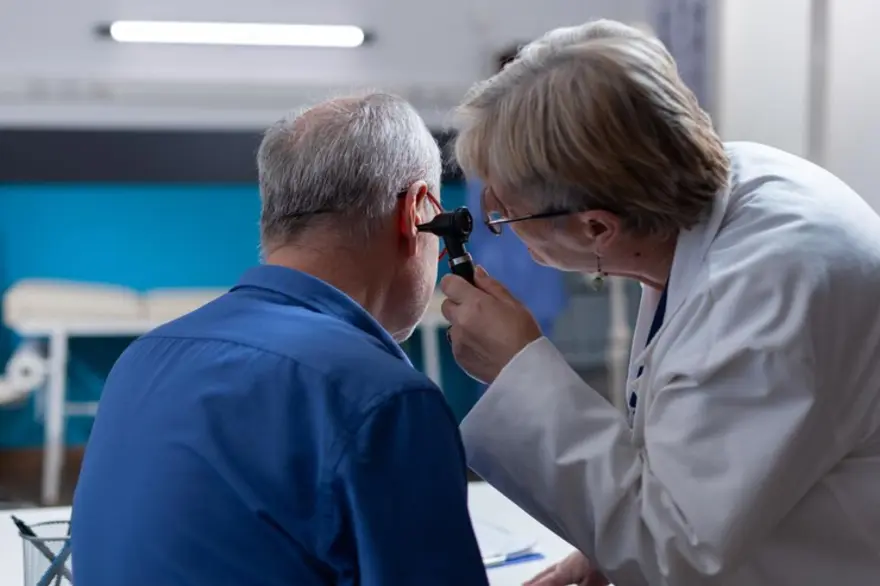Preventive Healthcare
Understanding Ménière's Disease: Symptoms, Causes, and Treatment
1861 Views
0

Ménière's disease is a chronic inner ear disorder that brings a unique set of challenges affecting your balance and hearing. Therefore, identifying the symptoms of Ménière's disease is imperative for early diagnosis and effective management. This comprehensive guide discusses the critical aspects of Ménière's disease, exploring its symptoms, diagnosis, and treatment options. Continue reading to know more!
What is Ménière's Disease?
Ménière's disease, or idiopathic endolymphatic hydrops, is a chronic inner ear disorder affecting your body's balance and hearing ability.
Is Ménière's Disease Serious?
Yes, Ménière's disease is serious as it is a progressive disorder with no permanent cure. While not life-threatening or contagious, the chronic nature of ménière's disease may require long-term management.
Is Ménière's Disease Common?
Ménière's disease is relatively uncommon compared to other health conditions. Estimates suggest that it affects about 5-10 people out of 100,000.
Who is Affected by Ménière's Disease?
This disease can affect individuals of any age, but Ménière's symptoms are commonly seen in people between 40 and 60. Both men and women can be affected, although some studies suggest a slightly higher prevalence in women.
What are the Symptoms of Ménière's Disease?
Ménière's disease symptoms can vary in intensity and duration. Common Ménière's disease symptoms include:
- Recurrent episodes of dizziness or a spinning sensation.
- Fluctuating hearing loss, often initially affecting one ear.
- Ringing, buzzing, or roaring sounds in your affected ear.
- A sensation of fullness or pressure in your ear.
- Headaches, nausea, and imbalance.
What Triggers Ménière's Disease Symptoms?
Various factors can prompt ménière's disease symptoms. For instance:
- High-stress levels and fatigue are common triggers for Ménière's disease symptoms.
- Consumption of high-salt foods, caffeine, and alcohol can contribute to symptom exacerbation.
- Changes in atmospheric pressure and hormonal fluctuations may play a role in triggering Ménière's disease symptoms.
- Exposure to loud noises
- High doses of medications like loop diuretics can affect the fluid balance in your inner ear.
What Causes Ménière's Disease?
The exact cause of Ménière's disease is not fully understood, and it is likely to result from a combination of factors such as:
- Changes in the volume or composition of fluid in your inner ear may cause Ménière's disease.
- Some researchers propose that compromised blood flow to your inner ear could lead to the symptoms of Ménière's disease.
- There may be a genetic predisposition.
- An abnormal immune response targeting your inner ear tissues has also been suggested as a possible cause of Ménière's disease.
- Viral infections affecting your inner ear could further potentially trigger Ménière's disease in some cases.
How to Diagnose Ménière's Disease?
Ménière's disease diagnosis is done by an ENT (Ear, Nose and Throat) specialist. The ménière's disease diagnosis process typically includes:
- Your doctor will gather information about your symptoms through a physical examination. Your medical history and any family history of Ménière's disease will be recorded.
- Audiometric tests for Ménière's disease, such as Pure-Tone Audiometry and Speech Audiometry, help assess hearing loss.
- Tests like Electronystagmography (ENG) or Videonystagmography (VNG) can evaluate your eye movements to detect abnormal vestibular function.
- Tests like Erythrocyte Sedimentation Rate (ESR) or C-reactive protein (CRP) might be conducted to detect signs of inflammation in Ménière's disease diagnosis.
How is Ménière's Disease Treated?
Ménière's disease treatment mainly focuses on managing your symptoms. Common ménière's disease treatment strategies include:
- Diuretics, anti-vertigo medications and anti-nausea medications are commonly used for ménière's disease treatment to reduce fluid buildup.
- Vestibular Rehabilitation exercises to improve balance and reduce dizziness.
- Hearing Aids for those with significant hearing loss.
- Intratympanic injections into your middle ear to reduce symptoms.
- In severe cases, surgery may be considered.
What are Other Treatments for Ménière's Disease?
Other therapies for ménière's disease management include:
- Betahistine: This medication is thought to improve blood flow in your inner ear and is sometimes prescribed for ménière's disease.
- Acupuncture: You may find relief from ménière's disease symptoms through acupuncture. It is a form of alternative therapy where thin needles are inserted into specific areas of your body to alleviate pain.
- Pressure Pulse Treatment: Devices that deliver micro pressure pulses to the ear to displace built-up fluid have been explored as a potential non-invasive option for treating ménière's disease.
What are Surgical Treatments for Ménière's Disease?
Common surgical treatments for ménière's disease include:
- Endolymphatic Sac Decompression (ESD): This procedure involves removing a small piece of bone from the inner ear to improve fluid drainage
- Vestibular Nerve Section (VNS): Severing the vestibular nerve, responsible for transmitting balance signals, can help control vertigo. This procedure, however, carries a risk of hearing loss.
- Labyrinthectomy: Removal of the entire inner ear can be considered in severe, incapacitating vertigo cases. This procedure results in total hearing loss in your affected ear.
- Cochlear Implant: If you have significant hearing loss, a cochlear implant may be considered to improve hearing function.
How to Reduce the Risk of Developing Ménière's Disease?
While there is no guaranteed preventive method for reducing the risk of Meniere's disease, there are various lifestyle changes, such as adopting a low salt diet, stress management, proper sleep schedule, etc., that you can adopt to keep good ear health and reduce the chances of the disease worsening if you already have it.
What's the Outlook for People with Meniere's Disease?
Most people with ménière's disease experience moderate to severe hearing impairment in the impacted ear within 10 to 15 years. But the prognosis of Ménière's disease also varies depending on the treatment outcome and how you take care of your ear health.
Does Ménière's Disease go Away?
There is currently no permanent cure for ménière's disease. However, some may experience periods of remission, where symptoms subside or become less severe, while others may have more persistent symptoms.
I Have Ménière's Disease. How Do I Take Care of Myself?
Here are some self-care strategies that you can adopt:
- Adopt a low-sodium diet to reduce fluid retention.
- Maintain proper hydration, as dehydration can affect the fluid balance in your body.
- Avoid exposure to loud noises, and use ear protection in noisy environments.
- Take prescribed medications as directed and communicate any concerns or side effects to your healthcare provider.
When to See a Doctor?
If you experience persistent discomfort, pain, or unusual sensations in your ear, you should consult a doctor promptly.
Conclusion
Ménière's disease is a rare inner ear disorder that requires a proactive approach to self-care, personalised treatment plans, and ongoing medical support by an ENT specialist. If you suspect an inflammation in your body causing ear pain, get a CRP or ESR test at Metropolis Labs. Metropolis Healthcare stands out as one of India's leading diagnostic service providers, with a range of comprehensive blood and body fluid tests available for you both in our high-quality laboratories and in the comfort of your home. Book your test today!























 WhatsApp
WhatsApp
